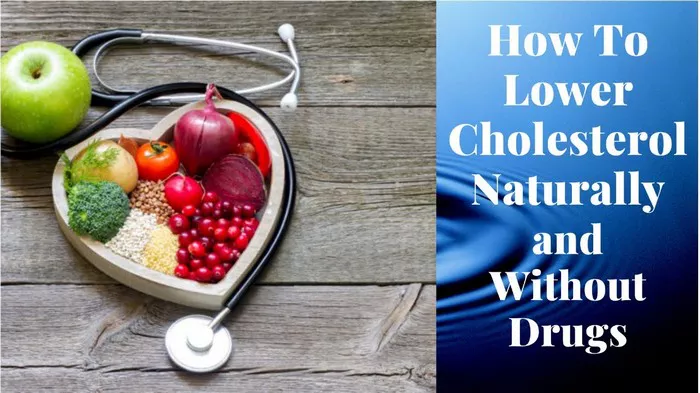High cholesterol levels are a significant risk factor for cardiovascular diseases such as heart attacks and strokes. While medications like statins are commonly prescribed to manage cholesterol levels, there are several natural strategies that can be effective in lowering cholesterol levels and promoting heart health. In this article, we will explore evidence-based approaches to lower cholesterol without relying on medication.
Before delving into strategies for lowering cholesterol, it’s important to understand what cholesterol is and how it affects our health. Cholesterol is a fatty substance produced by the liver and also obtained from certain foods. It plays a vital role in building cell membranes and producing hormones. However, high levels of cholesterol, especially low-density lipoprotein (LDL) cholesterol, can lead to plaque buildup in the arteries, narrowing them and increasing the risk of heart disease.
Dietary Modifications
One of the most effective ways to lower cholesterol naturally is by making dietary modifications. Here are some key dietary changes that can help:
1. Reduce Saturated Fats: Saturated fats found in red meat, full-fat dairy products, and tropical oils like coconut and palm oil can raise LDL cholesterol levels. Replace these fats with healthier options like lean proteins, plant-based oils (olive, canola), and low-fat dairy products.
2. Increase Soluble Fiber: Soluble fiber helps lower LDL cholesterol by binding to it and eliminating it from the body. Foods rich in soluble fiber include oats, barley, legumes (beans, lentils), fruits (apples, oranges), and vegetables (brussels sprouts, carrots).
3. Incorporate Omega-3 Fatty Acids: Omega-3 fatty acids, found in fatty fish like salmon, mackerel, and sardines, as well as in flaxseeds, chia seeds, and walnuts, have been shown to reduce triglycerides and lower the risk of heart disease.
4. Choose Healthy Snacks: Opt for snacks that are low in saturated fats and trans fats. Instead of reaching for chips or cookies, snack on nuts, seeds, fresh fruits, or vegetables with hummus or yogurt dip.
5. Limit Added Sugars and Refined Carbohydrates: Excessive consumption of added sugars and refined carbs can contribute to weight gain and elevated triglyceride levels. Choose whole grains, fruits, and vegetables over sugary snacks and drinks.
Regular Exercise
Physical activity is another crucial component of managing cholesterol levels and improving heart health. Engaging in regular exercise can:
1. Increase HDL Cholesterol: High-density lipoprotein (HDL) cholesterol is known as “good” cholesterol because it helps remove LDL cholesterol from the bloodstream. Exercise, especially aerobic activities like brisk walking, jogging, cycling, and swimming, can raise HDL levels.
2. Aid in Weight Management: Maintaining a healthy weight is important for managing cholesterol levels. Regular exercise helps burn calories, reduce body fat, and improve overall cardiovascular fitness.
3. Lower LDL Cholesterol and Triglycerides: Moderate-intensity exercise has been shown to decrease LDL cholesterol and triglyceride levels, further reducing the risk of heart disease.
To reap the benefits, aim for at least 150 minutes of moderate-intensity exercise or 75 minutes of vigorous-intensity exercise per week, spread across several days.
Quit Smoking
Smoking is a major risk factor for heart disease and can also worsen cholesterol levels. Quitting smoking can lead to significant improvements in cholesterol levels and overall cardiovascular health. Seek support from healthcare professionals, join smoking cessation programs, or consider nicotine replacement therapy to help you quit successfully.
Manage Stress
Chronic stress can contribute to unhealthy habits like overeating, smoking, and physical inactivity, all of which can negatively impact cholesterol levels and heart health. Practice stress-reducing techniques such as meditation, deep breathing exercises, yoga, or engaging in hobbies and activities you enjoy. Getting an adequate amount of sleep each night is also essential for managing stress and promoting overall well-being.
Consider Herbal Supplements
Certain herbal supplements have shown promise in helping lower cholesterol levels. However, it’s important to consult with a healthcare provider before starting any supplements, as they may interact with medications or have potential side effects. Some herbs and supplements that may benefit cholesterol levels include:
1. Plant Sterols and Stanols: These compounds, found naturally in fruits, vegetables, nuts, and seeds, can help lower LDL cholesterol levels. They are often available as supplements or added to fortified foods like margarine.
2. Red Yeast Rice: Derived from fermented rice, red yeast rice contains compounds that may have cholesterol-lowering effects similar to statin medications. However, it’s crucial to use caution with red yeast rice, as it can also contain statin-like substances that may cause sideeffects.
3. Garlic: Garlic supplements have been studied for their potential to lower cholesterol levels, particularly LDL cholesterol and triglycerides. Garlic can be consumed fresh or in supplement form, but again, consult with a healthcare provider for proper dosage and potential interactions.
Monitor Cholesterol Levels Regularly
Even if you’re implementing lifestyle changes to lower cholesterol naturally, it’s essential to monitor your cholesterol levels regularly through blood tests. This allows you to track your progress and make adjustments as needed. Work closely with your healthcare provider to establish target cholesterol levels and develop a personalized plan for managing your cholesterol.
Conclusion
Lowering cholesterol naturally is achievable through a combination of dietary modifications, regular exercise, smoking cessation, stress management, and, in some cases, herbal supplements. By adopting a heart-healthy lifestyle, you can reduce your risk of cardiovascular diseases and enjoy better overall health and well-being. Always consult with your healthcare provider before making significant changes to your diet, exercise routine, or supplementation regimen to ensure they are appropriate for your individual needs and health status.


